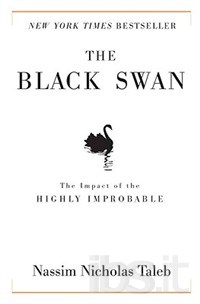The Black Swan (Taleb book)

Hardcover first edition
|
|
| Author | Nassim Nicholas Taleb |
|---|---|
| Country | United States |
| Language | English |
| Series | Incerto |
| Subject | Epistemology, philosophy of science, randomness |
| Genre | Non-fiction |
| Publisher | Random House (U.S.) Allen Lane (U.K.) |
|
Publication date
|
April 17, 2007 |
| Media type | Print, e-book |
| Pages | 400 pp (hardcover) |
| ISBN | (U.S.), (U.K.) |
| OCLC | 71833470 |
| 003/.54 22 | |
| LC Class | Q375 .T35 2007 |
| Preceded by | Fooled by Randomness |
| Followed by | The Bed of Procrustes |
The Black Swan: The Impact of the Highly Improbable is a book by the essayist, scholar, philosopher, and statistician Nassim Nicholas Taleb. It was released on April 17, 2007 by Random House. The book focuses on the extreme impact of certain kinds of rare and unpredictable events (outliers) and humans' tendency to find simplistic explanations for these events retrospectively. This theory has since become known as the black swan theory.
The book also covers subjects relating to knowledge, aesthetics, and ways of life, and uses elements of fiction in making its points. The author frequently shares anecdotes from his own life to elaborate his theories.
The book's first edition appeared in 2007 and was a commercial success. It spent 36 weeks on the New York Times best-seller list. The second, expanded edition appeared in 2010. The book is part of Taleb's four volume philosophical essay on uncertainty, titled the Incerto and covers the following books: Antifragile (2012), The Black Swan (2007–2010), Fooled by Randomness (2001) and The Bed of Procrustes (2010-2016).
Taleb, bestselling author of Fooled by Randomness, treats uncertainty and randomness as a single idea. See Black swan theory for Taleb's definition of a Black Swan event.
The main idea in Taleb's book is not to attempt to predict Black Swan events, but to build robustness to negative ones that occur and to be able to exploit positive ones. Taleb contends that banks and trading firms are very vulnerable to hazardous Black Swan events and are exposed to losses beyond those that are predicted by their defective financial models.
The book's position is that a Black Swan event depends on the observer—using a simple example, what may be a Black Swan surprise for a turkey is not a Black Swan surprise for its butcher—hence the objective should be to "avoid being the turkey" by identifying areas of vulnerability in order to "turn the Black Swans white".
...
Wikipedia
